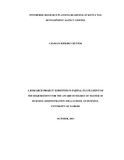| dc.description.abstract | The study focuses on the ERP System readiness at KTDA limited. It sought to assess the extent of readiness, challenges to readiness and indicators of ERP readiness at Kenya Tea Development Agency limited because past research indicate that 70% of ERP system implementation fail to deliver anticipated benefits and three quarters of this projects are unsuccessful. The study adopted a cross sectional survey design. The findings were obtained using a semi structured questionnaire that was administered personally by the researcher. The study established that the staff perceive an ERP system as a useful tool in the management of the KTDA operations that can positively impact on the cost, operations and timely completion of set financial targets. However, the study established that adequate, clear and effective communication and change management as most important factors to be considered in getting KTDA ready for ERP system implementation. The study also established that technical skills of staff are an important factor to consider while implementing ERP system. Financial crisis and system failures did not have a significant influence to ERP system readiness. The study specifically identified other competing priorities as a major challenge to ERP system readiness. Work experience of staff and appropriate executive sponsorship and commitment to the initiative are factors management of KTDA perceive to affect ERP system readiness. This study was limited by the fact that it only focused on one firm and therefore its findings may not be applicable to the entire tea sector. The study recommends that there is need to fully entrench the concept of ERP system by ensuring that staff are well trained and inducted by a specific period in the calendar year to improve their technical skills level. Since the respondents of this study perceive clear business case as being instrumental in determining organization ERP readiness, KTDA needs to communicate the benefits of ERP system to the staff members. Further research should be conducted to establish whether there is a correlation of ERP readiness on performance or liquidity of firms that has implemented the system. | en |

